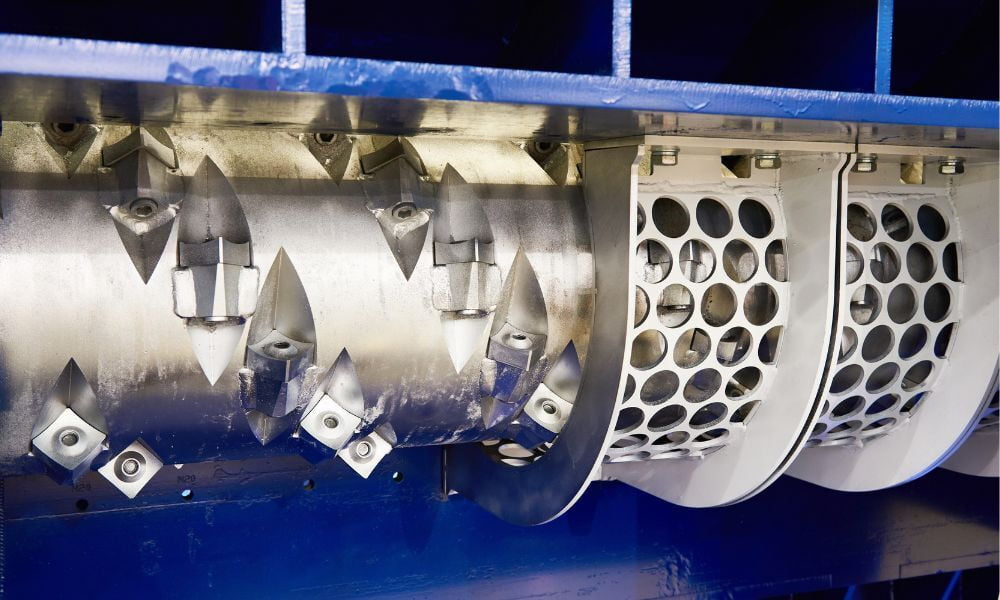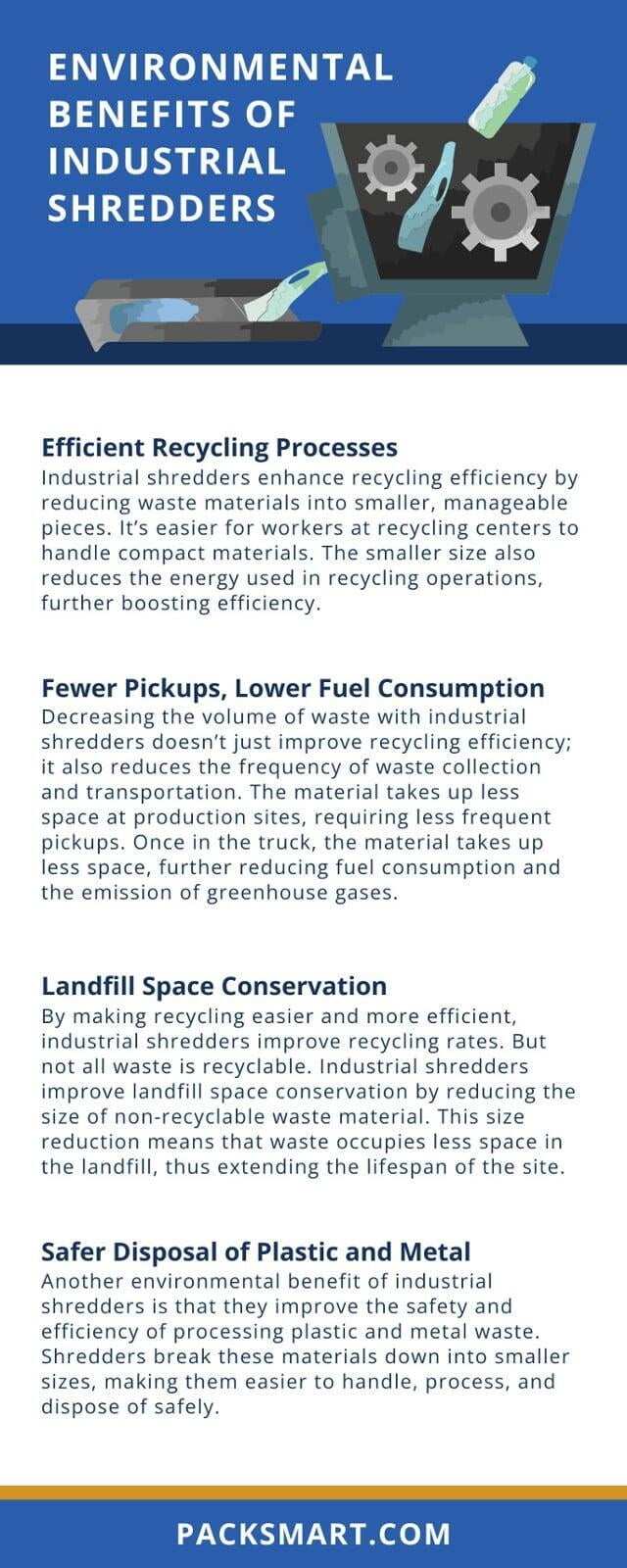
Effective waste management is crucial for preserving the environment. Proper processing and disposal reduce the impact of hazardous materials on ecosystems, contribute to resource conservation, and lower greenhouse gas emissions.
Industrial shredders facilitate efficient waste management by breaking down waste into manageable sizes. Discover six environmental benefits of industrial shredders and how these machines can help your business reach sustainability goals and save money.
1. Efficient Recycling Processes
Industrial shredders enhance recycling efficiency by reducing waste materials into smaller, manageable pieces. It’s easier for workers at recycling centers to handle compact materials. The smaller size also reduces the energy used in recycling operations, further boosting efficiency.
Breaking down large waste into smaller parts also expedites sorting materials into different waste classifications. This efficient sorting makes it possible to treat and process waste in the most efficient and environmentally friendly manner. By facilitating a more streamlined recycling process, industrial shredders contribute to a sustainable and eco-friendly waste management system.
Importance of Sorting at Recycling Plants
Proper sorting at recycling plants is crucial to the quality and efficiency of the recycling process. Without correct sorting, incompatible materials could end up together. This could lead to contamination and degradation of recyclable materials. It could even render entire batches of recyclables unusable. Poor sorting can significantly increase the volume of waste that ends up in landfills, undermining the purpose of recycling.
2. Fewer Pickups, Lower Fuel Consumption
Decreasing the volume of waste with industrial shreddersdoesn’t just improve recycling efficiency; it also reduces the frequency of waste collection and transportation. The material takes up less space at production sites, requiring less frequent pickups. Once in the truck, the material takes up less space, further reducing fuel consumption and the emission of greenhouse gases. Consequently, this contributes to a cleaner, healthier environment and helps combat climate change.
Additional Benefits of Fewer Pickups
Reducing the frequency of waste collection can also significantly decrease the associated costs, such as fees for waste management services. Companies can use the saved money to invest in other sustainable practices or improve their operations, contributing to long-term cost savings.
Fewer pickups also help companies to optimize their operations. Waste pickup schedules can be disruptive because they often require halting regular operations to accommodate the collection process, leading to potential productivity loss. They may also cause noise and traffic disturbances, affecting not just the workplace but also the surrounding environment.
3. Landfill Space Conservation
By making recycling easier and more efficient, industrial shredders improve recycling rates. But not all waste is recyclable. Industrial shredders improve landfill space conservation by reducing the size of non-recyclable waste material. This size reduction means that waste occupies less space in the landfill, thus extending the lifespan of the site.
Prolonging the lifespan of landfills helps manage the escalating volume of waste, reduce environmental pollution, and preserve the natural landscape. The conservation of landfill space is not just an environmental concern but also a significant economic one. The cost of creating new landfills is substantial, so extending the operational life of existing sites can result in significant cost savings.
4. Safer Disposal of Plastic and Metal
Another environmental benefit of industrial shredders is that they improve the safety and efficiency of processing plastic and metal waste. Shredders break these materials down into smaller sizes, making them easier to handle, process, and dispose of safely.
Plastic Waste Concerns
Plastic waste presents a significant environmental hazard due to its nonbiodegradable nature. It persists in the environment for hundreds to thousands of years and often ends up in our oceans, harming marine life. Additionally, when burned in open air, plastic releases toxic pollutants, including dioxins and furans, which can have profound adverse effects on human health and the environment.
Issues With Metal Waste
On the other hand, if not properly managed, metal waste can lead to soil and water contamination due to the leaching of heavy metals. These are harmful to both humans and wildlife. Moreover, the extraction and processing of new metals often involve substantial energy consumption and emission of greenhouse gases. Shredders make it easier to recycle and dispose of metal waste properly.
5. Lower Electronic Waste Pollution
Industrial shredders are also crucial in preventing environmental pollution by processing electronic waste, also known as e-waste. In business settings, e-waste typically consists of obsolete, broken, or surplus electronic devices and components. Examples include old computers, laptops, printers, fax machines, and copiers.
In industrial settings, discarded machinery and equipment may also constitute e-waste. This could encompass everything from manufacturing equipment with electronic components to large-scale power generators. Even smaller items like used batteries, light bulbs, and electronic meters can contribute to the e-waste problem.
Dangers of E-Waste and Opportunities
E-waste often contains harmful substances, such as lead and mercury, that can leach into the environment, causing significant harm. Businesses can use shredders to ensure adequate containment and disposal of these harmful substances, preventing environmental pollution.
Moreover, shredding electronic waste facilitates the recovery of valuable materials, such as gold, silver, and copper. Recovering these precious metals not only reduces the need for mining but also prevents the pollution commonly associated with these processes.
6. Upcycling
Lastly, industrial shredders support the conservation of natural resources by transforming waste into reusable materials. This process, known as upcycling, greatly reduces the need to extract fresh raw materials. Preserving natural resources helps maintain biodiversity, reduces waste and pollution, and mitigates the impacts of climate change.
Upcycling promotes a circular economy where waste isn’t a problem but a resource. Shredders can enable businesses to generate revenue from waste by aiding in the extraction of valuable materials from discarded items.
The Toll of Raw Resource Extraction
The use of industrial shredders in upcycling reduces the frequency of extracting and processing raw materials. These activities may involve extensive mining, logging, and quarrying activities, which can lead to habitat destruction, biodiversity loss, and soil erosion. They also consume vast amounts of energy and water, contributing to resource depletion.
Additionally, extracting and processing raw resources often releases harmful pollutants and greenhouse gases into the environment, contributing to air and water pollution and accelerating climate change. Extraction and processing also pose serious waste management challenges. For all these reasons, upcycling and making the most of processed materials is crucial for sustainability.
Shredding machines enhance recycling efficiency, significantly reduce pollution, and promote the conservation of natural resources. This equipment helps businesses reach their sustainability initiatives with faster, more effective waste management. Whether you need to process cardboard, paper, plastic, or metal, you can add an industrial shredder to your operations to gain these economic and environmental benefits.

